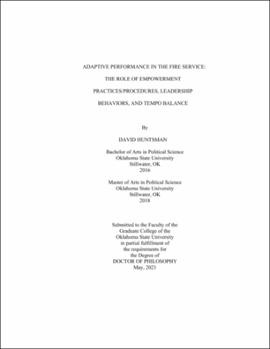| dc.contributor.advisor | Murphy, Haley | |
| dc.contributor.author | Huntsman, David | |
| dc.date.accessioned | 2021-09-23T19:42:46Z | |
| dc.date.available | 2021-09-23T19:42:46Z | |
| dc.date.issued | 2021-05 | |
| dc.identifier.uri | https://hdl.handle.net/11244/330846 | |
| dc.description.abstract | Fire departments, like other organizations that follow rigid hierarchical structures, face difficulties in being flexible or adaptive enough to address the needs generated by large and complex disaster environments. Research is lacking, however, on the ability of empowerment to enhance adaptive performance in emergency response organizations, which today face increasingly complex threats and growing responsibilities. The present study explores two models - the first tests the relationships between the empowerment practices of career development opportunities, autonomy, employee voice with two leadership levels, and adaptive performance. Tempo balance and the empowerment practices are also tested for interactive effects, a measure originally developed to capture firefighter stress and fatigue from excessive mandatory overtime policies. The second model performs moderated mediation to assess whether senior leaders must also be effective, empowering leaders (in addition to immediate supervisors) in order to achieve heightened levels of empowerment and subsequent adaptive performance, as many senior leaders in the fire service are criticized for being overly bureaucratic, risk averse, and resistant to change. Data were collected from four U.S. fire departments located on the West Coast - 1255 completed responses were returned. The results for the first model show that firefighters are better able to overcome stress and fatigue during complex incidents by relying on their training and ability to improvise, meaning these empowerment practices help compensate for poor tempo balance in fire departments from ineffective scheduling. The results for the second model display significant and positive direct relationships between empowering leadership behaviors and adaptive performance, although the interaction effects were not significant, suggesting compensatory effects - in that empowering immediate supervisors can compensate for risk averse, non-empowering senior leaders in their ability to personally empower firefighters on their own. These findings ultimately show how immediate supervisors are key to overcoming senior leader deficiencies and producing operational success during conditions of high complexity. Lastly, using a sequential explanatory mixed methods design, I use focus group data to support the empirical findings while providing additional insight into the nuances of leadership and empowerment in the fire service. Specific recommendations for fire service leaders are also provided. | |
| dc.format | application/pdf | |
| dc.language | en_US | |
| dc.rights | Copyright is held by the author who has granted the Oklahoma State University Library the non-exclusive right to share this material in its institutional repository. Contact Digital Library Services at lib-dls@okstate.edu or 405-744-9161 for the permission policy on the use, reproduction or distribution of this material. | |
| dc.title | Adaptive performance in the fire service: The role of empowerment practices/procedures, leadership behaviors, and tempo balance | |
| dc.contributor.committeeMember | Greer, Alex | |
| dc.contributor.committeeMember | McAleavy, Tony | |
| dc.contributor.committeeMember | Greco, Lindsey | |
| osu.filename | Huntsman_okstate_0664D_17073.pdf | |
| osu.accesstype | Open Access | |
| dc.type.genre | Dissertation | |
| dc.type.material | Text | |
| dc.subject.keywords | adaptive performance | |
| dc.subject.keywords | empowerment | |
| dc.subject.keywords | sequential explanatory mixed methods | |
| thesis.degree.discipline | Fire and Emergency Management Administration | |
| thesis.degree.grantor | Oklahoma State University | |
